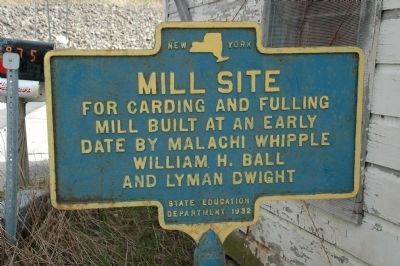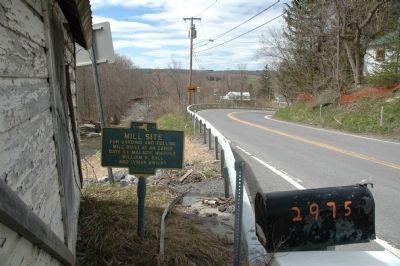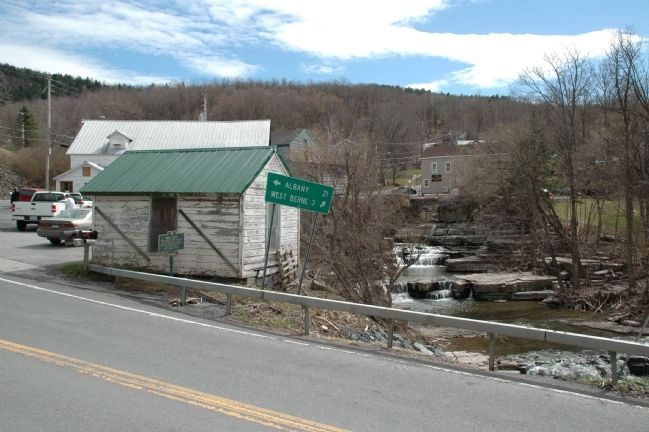Berne in Albany County, New York — The American Northeast (Mid-Atlantic)
Mill Site
Mill Built at an Early
Date by Malachi Whipple
William H. Ball
And Lyman Dwight
Erected 1932 by New York State Education Department.
Topics. This historical marker is listed in this topic list: Industry & Commerce.
Location. 42° 37.567′ N, 74° 8.03′ W. Marker is in Berne, New York, in Albany County. Marker is on Berne-Altamont Road (New York State Route 156), on the right when traveling south. Touch for map. Marker is at or near this postal address: 2975 Route 156, Berne NY 12023, United States of America. Touch for directions.
Other nearby markers. At least 8 other markers are within walking distance of this marker. Ax Factory (about 500 feet away, measured in a direct line); Weidman Home (about 500 feet away); Reformed Dutch Church (approx. 0.2 miles away); Cheese Factory (approx. 0.3 miles away); Anti-Rent (approx. 0.4 miles away); Schools (approx. half a mile away); Dedicated (approx. half a mile away); Pioneer (approx. 0.6 miles away). Touch for a list and map of all markers in Berne.
Regarding Mill Site. Carding is the process of combing fibers to untangle, straighten and lay them parallel before spinning them. Before wool can be spun into yarn for knitting or weaving into cloth, it first must be brushed, or carded. This tedious task was successfully mechanized in the second half of the 18th century by several British inventors, principally Richard Arkwright and James Hargreaves. By the late 1780s carding machines began to be built in the United States, carding as much wool in minutes as a hand-carder could do in as many hours. By 1811 the federal government estimated that on average every town had at least one carding mill where farm families could bring their wool and pay to have it carded. This made the domestic production of cloth much easier by removing this time-consuming step. As textile factories multiplied in the 19th century, however, people stopped making their own cloth at home, and custom carding mills declined. Today, of course, there are no longer thousands of neighborhood carding mills in America catering to people who make their own cloth at home by hand. The same technology, however, is still used in modern cotton and woolen factories.
Fulling is the beating and cleaning of cloth in water. The process shrank the loose fibres of the cloth, making it a denser fabric.
Also see . . .
1. Malachi Whipple Homestead. Welcome to the Hilltowns website entry (Submitted on July 14, 2012, by Howard C. Ohlhous of Duanesburg, New York.)
2. Malachi Whipple. Welcome to the Hilltowns website entry (Submitted on July 14, 2012, by Howard C. Ohlhous of Duanesburg, New York.)
Credits. This page was last revised on May 24, 2022. It was originally submitted on July 14, 2012, by Howard C. Ohlhous of Duanesburg, New York. This page has been viewed 606 times since then and 14 times this year. Photos: 1, 2, 3. submitted on July 14, 2012, by Howard C. Ohlhous of Duanesburg, New York. • Bill Pfingsten was the editor who published this page.


